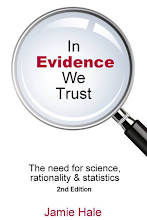Do you believe smurfs exist? If not, why not? So..can you prove they do not exist?
Do you believe there are talking bears in Alaska? There have been numerous eye-witness accounts
of these bears speaking with each other in the wilderness of Alaska. The
eyewitnesses who have reported seeing these bears are honest, intelligent, hard working
citizens. Why would they lie?
You probably think that asking whether or not one believes
in smurfs or talking bears is absurd. There
isn’t a shred of evidence for either. However,
ask yourself if you can prove there are no smurfs or talking bears? You cannot prove they do not exist. Knowing what you know about the natural world
(thanks to scientific processes) you know it is very unlikely that either
smurfs or talking bears exist. What if someone whom you respect and trust
tells you they have seen smurfs, or they just have a feeling that they exist- They
Know They Are Real ?
What about the extremely evasive Immaterial Soul or
as it is sometimes referred the Immaterial Mind? Many people believe the soul is very real,
even though there isn’t an angstrom (one hundred- millionth of a centimeter) of
evidence that it exists.
"My fundamental premise about the brain is that its
workings- what we sometimes call “mind”- are a consequence of its anatomy and
physiology, and nothing more. “Mind” may
be a consequence of the action of the components of the brain severally or
collectively. Some processes may be a
function the brain as a whole."
Carl Sagan
"… mind and brain are inseparable. The brain is a complex biological organ of
great computational capability that constructs our sensory experiences,
regulates our thoughts and emotions, and controls our actions. The brain is responsible not only for
relatively simple motor behaviors, such as running and eating, but also for
complex acts that we consider quintessentially human, such as thinking,
speaking, and creating works of art.
Looked at from this perspective, mind is a set of operations carried out
by the brain, much as walking is a set of operations carried out by the legs,
except dramatically more complex."
Eric Kandel, Nobel Laureate
History of the Soul: Brief
Plato, who repudiated observations and experiments
believed the only reason that we can think about ourselves and our mortal body
is that we have an immaterial, immortal soul.
Subsequently, in the thirteenth century St. Thomas Aquinas incorporated the
soul into Christian thought. Aquinas and
later religious thinkers believed that the soul is of divine nature. In the
seventeenth century, Rene Descartes constructed the idea that humans have a
dual nature: they have a body made up of material substance, and a mind, which originates from the spiritual
nature of the soul. Gilbert Ryle (Philosopher
of Science) referred to the soul as “the ghost in the machine.”




